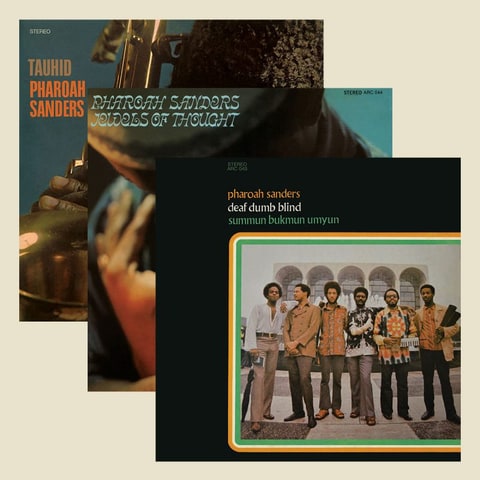Review: Pharoah Sanders
by
, 12-08-2017 at 11:05 AM (802 Views)
The music that saxophonist Pharoah Sanders made in the late Sixties and early Seventies will probably always be categorized as jazz. But that seems wrong, somehow. Where bebop is all about form and its infinite variations, the sounds put forth on Sanders albums such as 1967's Tauhid, 1969's Jewels of Thought, and 1970's Deaf Dumb Blind (Summun Bukmun Umyun) – records filled with celebratory Latin grooves; vicious, often cacophonous sax playing; and expansive drone-like bliss-outs – seem far more concerned with the Infinite.
And that idea still resonates today. It's the driving force, for example, behind the music of breakout saxist Kamasi Washington, whose entire approach – large band, long songs, spirituality to spare – feels like the second coming of Pharoah. (Meanwhile, the 77-year-old Sanders continues to tour the world.)
Originally released on the Impulse! label and reissued this month individually and in a deluxe three-LP set courtesy of Anthology Recordings, these albums find the Little Rock, Arkansas–born Farrell Sanders – he started going by "Pharoah" in the early Sixties while working with the ancient-Egypt–inspired Sun Ra – near the start of his career as a bandleader. Tauhid, the earliest album in this set, is the saxophonist's sophomore outing. By the time Deaf Dumb Blind was released, Pharoah was only about 30, but he had seen a lot by then: In addition to making his own recordings and gigging with Ra, he had spent almost two years in John Coltrane's final working band, which featured Alice Coltrane on piano. Like those artists and Sun Ra, Pharoah became a renowned yet often misunderstood torchbearer for what was then known as free jazz, or simply the New Thing.
But Pharoah has also been filed under "spiritual jazz," a label that better describes what's heard on these albums. The epic tunes are essentially quests, with any number of peaks and valleys along the way. In that sense, Pharoah's music on these albums can be seen as an extension of John Coltrane's seminal spiritual odyssey A Love Supreme, but with more musicians, more movements and more freedom.
more...













 Email Blog Entry
Email Blog Entry